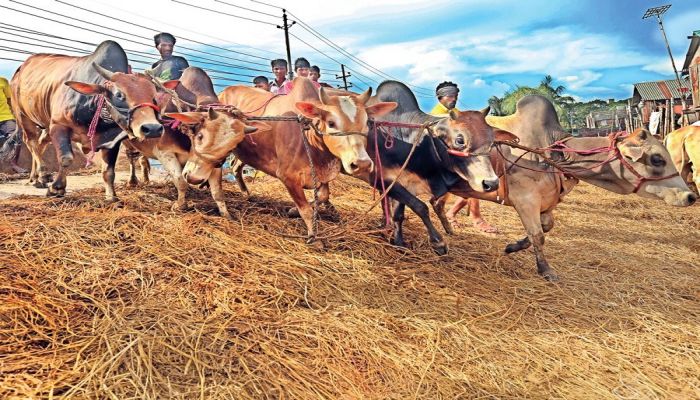
Desk Report
Publish: 10 Jul 2020, 03:57 pm

Photo: Collected
Health experts have expressed apprehension that the risk of infection of Covid-19 may increase dramatically after the coming Eid-ul Azha, as tens of millions of people are directly engaged in sacrificing more than 10 million animals in the country.
In order to check the spread of coronavirus, they proposed that the government might encourage a system under which the livestock are sold, bought and slaughtered and the meat is delivered under a single program in a certain region, such as the union, the village or the district, to minimize people's participation.
In addition to promoting online cattle markets, the experts stressed the need to follow the health guidelines while buying and selling animals in traditional markets, slaughtering them and distributing their meat.
"We can see a significant increase in the incidence of infection of Covid-19 after 15 days of Eid-ul Azha, unlike Eid-ul Fitr, as there are major activities involving the sacrificing of livestock," said Prof Nazrul Islam, former Vice-Chancellor of Bangabandhu Sheik Mujib Medical University (BSMMU).
Noting that the infection rate remains at 21-22% (of the COVID samples tested) in the country, he said that the infection rate did not see any significant change after Eid-ul Fitr, but Eid-ul Azha is different.
Prof Nazrul, also a member of the National Technical Advisory Committee created to fight against Covid-19, said he recently instructed the government not to set up any cattle markets inside the city limits of Dhaka, Narayanganj and Chattogram.
The committee told the government that it needs to maintain the health guidelines in the cattle markets across the country.
Talking to the news agency, Prof Be-Nazir Ahmed, former director (disease control) of the Directorate General of Health Services (DGHS), and Muzaherul Huq, former regional advisor (South East Asia) of the World Health Organisation (WHO), said that if the traditional process of animal sacrifice continues this time as well, it will not be possible to maintain social distancing, increasing the risk of Covid-19 infections spiking largely across the country.
More than 10 million animals are normally sacrificed in the country, and more than 50 million people are directly involved in the process of buying , selling and slaughtering animals, and in the distribution and collection of meat from sacrificial animals, they said.
The two experts said the government can consider the arrangement of the sacrificial animals of the whole country under a central management system. In that case, the model adopted by Saudi Arabia can be followed as hajj pilgrims deposit money for sacrificing animals there, but they have no direct engagement in the process of buying and slaughtering the animals, nor in the distribution of the meat there.
“There’ll be a high risk of transmission of coronavirus during the Eid-ul Azha as some 12 million animals may get sacrificed in the country and some 60 million people get directly engaged in the process,” said Prof Be-Nazir Ahmed.
A significant number of people may be engaged in the slaughtering of cattle, manufacturing, delivery and selection of sacrificial meat, adding that while the amount of people participating in such operations may vary, it will be more than 60 million.
“There are many public activities alongside mass exodus during this Eid. But we can bring the sacrificial animals under a national management system. We see those who sacrifice animals in Saudi Arabia are not directly involved there. We can consider whether we can apply it in our country. Or at least we can arrange a single management system for each specific area to complete the activities related to sacrificial animals,” said Prof Be-Nazir Ahmed.
“If we can do so, the cow or goat farmers will not be losers and social distancing can largely be maintained,” said the former director of DGHS.
Echoing Prof Be-Nazjir, Muzaherul Huq said that the government might recommend the implementation of a central management structure to complete all operations, from the procurement of sacrificed animals to the delivery of meat, such as Saudi Arabia and some developed countries.
He said that if the central management can’t be introduced, the government can arrange a single management system for each area like union, village or ward under the authorities of the local government bodies.
“Alongside promoting the online markets, the animal markets (haats) can also be decentralised outside the cities,” said Muzaherul Huq, also the founding chairman of Public Health Foundation Bangladesh.
Source: UNB
Subscribe Shampratik Deshkal Youtube Channel
© 2024 Shampratik Deshkal All Rights Reserved. Design & Developed By Root Soft Bangladesh